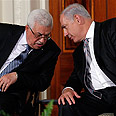
The psychological roadblock
Op-ed: Psychological barriers to peace more damaging than any checkpoint or rocket
This past Saturday night, Israeli and Palestinian representatives met in Amman, Jordan to begin the third round of exploratory talks in an attempt to reignite the crippled negotiations that have come to define the Middle East peace process.
Unfortunately, however, this diplomatic disguise will produce just another set of pessimistic headlines and banter of blame with each side accusing the other of an unwillingness to take the necessary measures that would lead to serious negotiations.
Palestinian officials will grumble about Israel’s failure to freeze construction in the settlements and east Jerusalem, while Israeli representatives will accuse the Palestinians of making haughty preconditions that will hurt Israel’s bargaining position during official talks.
Both diatribes are nothing new; however, they fail to highlight the primary obstacle behind the current impasse: the psychological roadblock. The psychological barrier is more damaging than any Israeli military checkpoint that degrades Palestinians, and more traumatizing than any rocket fired from Gaza into Israel. It is a hurdle that has grown exponentially over the years, due to broken promises, deceptive policies and the failure by both sides to fully commit themselves to previous agreements aimed at leading to final-status negotiations.
Misconceptions of favoritism
On one hand, Israelis are psychologically wounded by the Palestinian Authority’s lack of resourcefulness in curbing the incitement of violence, and by resentment that a withdrawal from land in the Gaza Strip has only brought barrages of missiles to residents of southern Israel. For their part, Palestinians view Israel’s continued settlement building as an expansionist move tantamount to the annihilation of the Palestinian psyche.
Psychologically, these factors have only reinforced the notion that each side refuses to recognize the other’s legitimate and inalienable right to self-determination in its “homeland.”
As longtime Palestinian negotiator, Saeb Erekat, said regarding Israel’s settlement policy, “Settlements to Palestinians are the equivalent to a bus exploding in Tel Aviv to Israelis. That's the ultimate threat. It's land, it's future. Settlements are put there to stop us from having our future - independent state, freedom.”
From a psychological standpoint, there is nothing worse than the denial of one’s existence - a mantra that has been incontrovertibly caused by both Palestinian terrorism and Israeli settlement expansion.
Furthermore, there is a psychological skepticism that has plagued both sides through perceived misconceptions of favoritism by the various third-party negotiators. This was a Palestinian grievance during the 2000 Camp David Summit, and was most recently displayed in statements criticizing the Quartet’s Middle East envoy, Tony Blair, as catering exclusively to Israeli interests.
Conversely, Israelis have felt unfairly cornered by what they misconstrue to be American President Barack Obama’s partiality towards the Palestinians, based upon remarks he made concerning the territorial definition of Israel.
More mediators needed
So what is the answer to defeating these psychological bunkers? First, a wider range of third parties should be directly involved in the process. Second, these third party negotiators should refrain from publicly making statements that trigger greater acts of self-defiance.
It is a positive sign that the Jordanians are beginning to take a more proactive role in the process; however, within the Arab world, the Jordanian monarchy has often been labeled a pawn of the United States, whose regional interests have often clashed with other Arab nations.
One step would be to include certain Gulf States, such as Qatar and Oman, in the negotiating process. As Arab countries, they would be a welcomed partner by the Palestinians and could also appeal to the Israelis, based upon cordial financial and economic cooperation the countries have shared in the past, despite not having “official” diplomatic relations with one another.
Another option is to include non-Arab Muslim countries such as Indonesia, Malaysia, Turkey and Pakistan - an idea repeatedly espoused by former Pakistani President Pervez Musharraf, who has advocated the idea of diplomatic relations between his country and the Jewish state. These countries, by being acceptable to the Palestinians and Israel, would serve to gain tremendously from their participation.
This could help mend ties with Turkey, create a thawing of relations with Indonesia - a country that is home to the world’s largest Muslim population and has expressed its desire to establish full relations with Israel based upon the establishment of a Palestinian state, and most importantly, open up the door to diplomatic overtures with Pakistan, which Israel could use to increase its strategic depth in the region vis-à-vis Pakistan’s proximity to Iran.
Introducing a complimentary set of negotiators could be just what is needed to break the psychological paralysis.
Would this create too many chefs in the kitchen? Possibly. However, the existing chefs have not even been able to prepare a simple appetizer.










